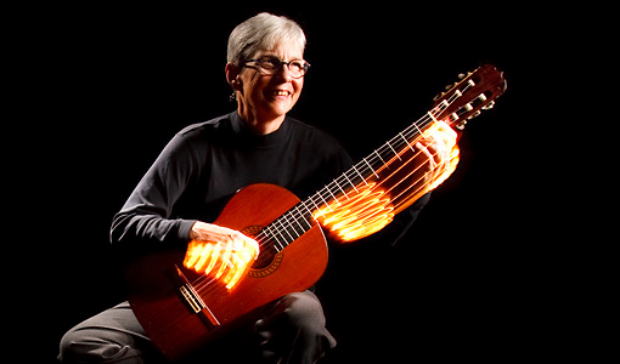As part of the 125th anniversary celebration, a committee of well-informed St. Thomas staffers set out to identify 125 people who have had a lasting impact on our community. Making lists of influential or important people, places or things is an exercise fraught with challenges. There will inevitably be discussions about criteria and selection process. And in a worst-case scenario, there even can be an unintended omission of a worthy entrant.
A much longer list was pared to 125 individuals, and short bios were written on each. Lastly, the bios were collected in a book now available for purchase in the St. Thomas bookstore. We don’t want to take away all the excitement about who made the final list, but we do want to identify 12 members of the group who represent the best St. Thomas has to offer.
Again, this is not a definitive list. For that, you’ll need to buy the book Instead, think of this as an introduction to the larger group.
Agnes Brombach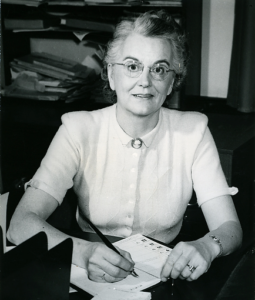
In July 1933, Holy Cross priest Matthew Schumacher, before relinquishing the presidency of St. Thomas to return to Notre Dame, sat down and wrote letters of thanks to faculty and staff.
For his secretary, Agnes Brombach, who had served him all five years, he wrote a recommendation, “To Whom It May Concern: This brief note is to commend the work of Miss Brombach in the highest terms as secretary and from every point of view. Her work was always effective, her devotion untiring, her understanding of problems most intelligent, and her gracious meeting of the public contributed much in meeting many of the duties that fell to the lot of the president. It is a pleasure to recommend her unqualifiedly for her very high type of work.”
Brombach went on to serve three more presidents of St. Thomas, and each of them could have written the same praise. “Each day is different,” she told an Aquin reporter in 1947. “I start at 8:30 a.m. and often before I have my coat off, I have received several wires and answered two or three phone calls.” History was her memory: She could picture the vacant lot on which Aquinas Hall was built, but averred that most of “Summit Avenue has never changed.”
She traveled extensively, once hiring a plane with five others and flying 3,000 miles in four days, a feat in 1940. An avid gardener, she was a godsend to campus botanists, being the only one on campus who could get African violets to bloom in her office by coaxing them into thinking it was springtime in their native habitat.
Joseph Connors ’37
If one accepts the Victorian definition of a gentleman as “one who never inflicts pain,” Joe Connors was a gentleman’s gentleman.
Connors’ career encompassed teaching at the academy and the college as well as stints as an editor of the Catholic Digest and a development writer during the college’s first capital campaign, A Program for Great Teaching, in the early 1960s. He principally is known for his widely praised book, Journey Toward Fulfillment: A History of the College of St. Thomas, published in 1986.
The grace with which Connors wrote was matched by his personality. “He was the gentlest of men,” a close friend observed, adding, “I never heard Joe say anything about someone else unless it was true, necessary and kind.”
It took Connors several years to complete his thesis for a doctorate in English from the University of Minnesota, and he once described the wide-ranging opus as “finding out what everyone in the 19th century thought about everyone in the 18th century.” He had an extraordinary breadth of interests. He could quote verbatim from old movies, talk knowledgeably about boxing and critique Sherlock Holmes and Charles Dickens.
He was one of the college’s most respected faculty members. A chair of his department put it this way in an evaluation: “Joe Connors continues to be the main source of strength and inspiration [in the department]. Nothing ostentatious – just superb teaching, continual intellectual and professional commitment and well-reasoned counsel.”
Danny Donahue 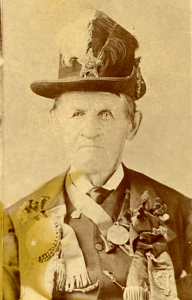
Every institution has what might be called its faithful orderlies, those whose steadfast devotion to its smallest tasks ensure the continuity of its larger vision. The 19th-century model for those who have so served St. Thomas down through the years was Danny Donahue, who, often as valet to Bishop Thomas Grace, would accompany him on walks around an early bucolic campus.
Donahue was the college bell ringer, messenger, mailman, factotum – a simple man brought to campus by St. Thomas’ first rector, Father Thomas O’Gorman. College historian Joseph Connors described Donahue as students affectionately saw him: “an illiterate, muffin-faced Irishman [with] a childlike and innocent soul.” He loved tobacco, but kept his snuffbox and pipe out of sight lest he scandalize students, and he delivered mail without the ability to read by keeping professors’ letters in separate pockets. A eulogy in the St. Thomas Collegian in 1905 recalled “his bowed head and kindly features welcoming the timid approach of the new student and gladdening the return of the old alumnus.”
Donahue left campus in 1900, but returned shortly to the only place he knew as home and to a task he performed until his death. It was, in the words of the Collegian, “the ringing of the Angelus performed with devout zeal and a humility that was beautiful to see. Morning, noon and night year after year, he stood with bared head while he repeated reverently, in his half-audible whisper, the words of the Angel to Mary.”
Bernice Folz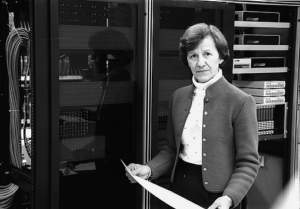
The career of Bernice Folz at St. Thomas is a prime example of the entrepreneurial university. She joined the faculty in 1978 to teach computer science and ended up establishing St. Thomas’ Graduate Programs in Software, the fourth largest area of its kind in the United States and eventually one of the largest in the world, with 40 percent of students coming from other countries.
The approach was classically entrepreneurial: Discern an unmet educational need, seek advice on how to develop a curriculum from professionals in the field, recruit these professionals to teach as adjuncts and promote the innovative educational program to a target audience. Based on her own professional experience in information technology, as well as her days as a student of educational method and a teacher of computers and business, she set about to bridge a gap between those designing the computer hardware and those managing data systems.
Folz started with 52 master of software design and development students, used industry consortia to review programs and develop new degrees such as the M.S. in software engineering and the master of software systems, and started a technology education center for nondegree workshops. She internationalized the program through contacts in foreign embassies and by offering a seminar on a country’s history, culture and technology, followed by a visit to that country.
Folz received the university’s Distinguished Service Award when she retired in 2003, and in 2008 she was chosen for the inaugural class of individuals inducted into the Minnesota Science and Technology Hall of Fame.
Steve Fritz ’71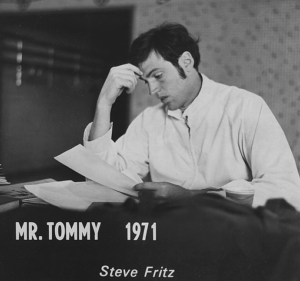
Steve Fritz became St. Thomas’ all-time winningest basketball coach in 2004 with 418 victories, not bad for someone who has described basketball as his “side job.”
Fritz has been involved on the court since his student days (1967-71), when he helped lead the Tommies to a combined 84-24 record and two conference titles while scoring 1,944 points and snaring 915 rebounds, second and third totals, respectively, in the school’s record book. He was an assistant to Coach Tom Feely from graduation to his appointment to succeed Feely in 1980, with additional duties in 1992 when he was made athletic director. Prior to 1992, in addition to coaching, he held full-time positions on campus as assistant to the president, director of financial aid and director of admissions.
Fritz is a 14-time MIAC Coach of the Year and four-time NCAA Division IIIWest Region Coach of the Year. His teams have won 14 conference championships, and from 1988 to 1995, St. Thomas won either the MIAC regular season title or the league tournament championship, going 119-21 in regular-season games during that period. He is ranked third all-time in MIAC men’s basketball coaching victories. His 29-year record leading up to the 2009-10 season is 541-239 (.694), and his 2008-09 team went 30-0 before losing in the Elite Eight.
Despite basketball roots, Fritz has drawn praise for looking at the big picture of campus athletics. Coaches in other sports know they have a sympathetic ear when it comes to budget and staffing requests, as well as the comfort of dealing with one who knows the coaching life.
William Malevich ’55
When someone came up to Bill Malevich in a Target store and said, “I’m Potato Salad,” the dean of students knew exactly what he meant.
For years, Malevich wrote an “Ask the Dean” column in a campus publication, and the queries rolled in under pseudonyms like “Doubting Thomasite,” “Save the Planet Janet” and “Lost in the Library.” They came addressed to “Deano Supremo,” “Big Bad Bill” and other less-kind names, but virtually all got answers.
The column was an offshoot of face-to-face advice Malevich dispensed from a booth outside his office on Mondays, exhibiting a humorous and genuinely concerned attitude toward students that made him easily the most visible administrator on campus. His sympathetic attitude toward troubled students was born of his own wayward ways at St. Thomas in the 1950s (“I partied more than I studied”), as well as a counseling background that leaned toward rehabilitation rather than expulsion or suspension.
He returned to St. Thomas in 1965 to work in admissions and counseling, and two years later became dean of students. Over the years, students wrote him about serious issues – alcoholism and abortion – as well as about the absence of onion rings in the cafeteria and the difficulties of the subjunctive tense in German. His answers mixed wisdom and wit. “What is the meaning of life?” one student asked. His reply: “If I really gave you the answer to that question, wouldn’t it take the fun out of discovering the answer for yourself?”
Malevich retired in 1993, and an award and scholarship were named in his honor.
G.W.C. Ross 
Guy Whittier Chadbourne Ross had a curious grading curve: “A is for God; B is for me; C for honor students, and D and F for the others.”
Armed with a baccalaureate degree from the University of Chicago and an LL.B. from Harvard, he started teaching law at St. Thomas in 1926. When the law school closed seven years later, he switched to constitutional history and government, earning his Ph.D. in political science from the University of Minnesota in 1942 at 62.
His perseverance was evident early. When his parents bought him a horse to wean him from what they considered excessive reading, he devoured books on an ambling horse. Hundreds of future lawyers populated his classrooms in the 28 years he taught political science courses, and they remembered his Socratic style. “I wondered why Doc Ross never agreed with my answers,” noted one former student, “until I realized he would simply take a position opposite of mine to force me to argue my case.”
G.W.C. disdained what he called “methods of teaching.” He never used notebooks in class and never made out a lesson plan, much less filed a syllabus. He was fond of intimidating incurious students in his course – opening remarks by threatening to keep dismissing class immediately in the absence of any questions about course material. He never worried about “covering the ground,” about reaching a predetermined end point. “I realized that any course worth having in the curriculum could not be exhausted over a semester, or a year or two years,” he explained.
Monsignor John A. Ryan
Monsignor John A. Ryan was the most effective social justice advocate in the Catholic Church during the first half of the 20th century.
A son of Irish immigrant farmers in Minnesota, he already was conversant with progressive political and economic issues by the time he entered St. Thomas in 1887, and he continued to study social problems in private reading while at the college and, later, the St. Paul Seminary. After ordination in 1898, he received graduate degrees in theology from the Catholic University of America, with a Ph.D. thesis arguing on moral grounds for a living wage. After teaching at his seminary alma mater for 13 years, he returned to Catholic University where, with a joint faculty appointment in political science and moral theology, he became nationally known as “Right Reverend New Dealer” for his support of President Franklin Delano Roosevelt.
Ryan was no socialist, but he believed in government intervention to temper the effects of unbridled capitalism. In speeches and published works, he supported a minimum wage, unemployment and health insurance, child labor laws, collective bargaining and a more just distribution of wealth at a time when these positions were flash points in national debate. From 1920 to 1945, he was the first director of the National Catholic Welfare Council’s Social Action Department, the home of Catholic social activists and a disseminator of progressive ideas often found at the core of New Deal legislation. He gave the invocations at two FDR inaugurations, and both men died in 1945.
Mohamed Selim
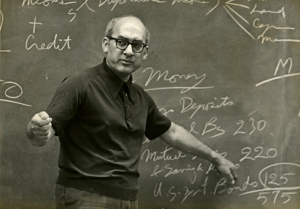 Dubbed by one observer as “the hyperkinetic guru of economic education,” Mo Selim provided educational opportunities at St. Thomas for students of all ages and walks of life.
Dubbed by one observer as “the hyperkinetic guru of economic education,” Mo Selim provided educational opportunities at St. Thomas for students of all ages and walks of life.
In 1959, before diversity was in the collegiate vocabulary, Selim, a Muslim, signed on at St. Thomas for only a year because he wasn’t sure he would fit in at a Catholic school. Forty-five years later, he retired with the longest tenure of any lay faculty member and looked back with these words: “Teaching is not an occupation but rather a vocation, a commitment to growth, knowledge, sharing and communication for the mind, the heart and the spirit.”
Selim chaired the Department of Economics from 1966 to 1987, was chosen Professor of the Year in 1978 and taught undergraduate or graduate classes until 1999. He started summer institutes in economics for high school social science teachers, and they grew into the St. Thomas Center for Economic Education, which he directed for 34 years. At about the same time, he began the Center for Senior Citizens’ Education. Over the years, more than 8,000 people 55 years or older enrolled in undergraduate courses at no cost, and an additional 46,000 senior citizens took advantage of seminars and lectures offered on the St. Paul and Minneapolis campuses.
Besides directing the two centers, Selim made regular visits to his native Egypt to do research and serve as an economic development consultant. He was elected president of the Association of Egyptian-American Scholars of the United States and Canada. Upon his retirement from St. Thomas, he received its Distinguished Service Award.
Laurie Trow ’93
 Laurie Trow Kelly, the only female basketball player in NCAA history to score in double figures in 100 or more consecutive games and a member of Division III’s 25-year team, drew more attention to women’s athletics at St. Thomas than anyone else since undergraduate coeducation began in 1977.
Laurie Trow Kelly, the only female basketball player in NCAA history to score in double figures in 100 or more consecutive games and a member of Division III’s 25-year team, drew more attention to women’s athletics at St. Thomas than anyone else since undergraduate coeducation began in 1977.
As a 6-foot sophomore center, she led the 1990-91 Tommie team to the Division III championship, averaging nearly 30 points and 10 rebounds a game while shooting 75 percent from the field during a 5-0 playoff run.
A speech-communications major from Rochester, Minn., she was perhaps the best player in MIAC women’s basketball history. During her career, she was a three-time Kodak All-American and ranks first in conference history in scoring (2,607 points), rebounding (1,204) and blocked shots (203), and holds more than 15 school and conference records. She led the Tommies to a 98-15 record, during which they were 72-8 in conference play. She was part of a 40-game consecutive winning streak, an MIAC record, and led the 43-game victory streak in home games.
Despite individual achievements, Trow always was a team player. “Nothing can surpass the feeling of winning a national championship,” she once said. “Individual records really don’t mean anything to me.” In 2003, she was named head coach of women’s basketball at Northern Arizona University, where she led the team to its first Big Sky Conference tournament title and its first NCAA tournament bid.
Chuck Williams ’58 
The Aquin headline above the story about senior Chuck Williams read, “1958’s Mr. Tommy Leads in Many Areas.”
The article, which accompanied a photograph of the English major with his omnipresent pipe, failed to mention one of those areas: Williams was the first student of color accorded that honor. The omission was not indicative of campus integration – indeed, St. Thomas was far less diverse at that time than it is today – but instead it was a measure of the personal acceptance that this particular black student had achieved among his peers.
The article spoke ofWilliams as an Army veteran, a reader of Greek plays, president of his class, member of two choral groups on campus and, especially, as a diplomatic student manager of the always-maligned campus bookstore. There he handled the complaints of fellow students with calm finesse, “enhancing my people-contact skills,” as he later put it. “Students looked upon the bookstore as a conspiracy to separate students from their hard-earned funds and was not a place to become popular,” he said.
Williams went on to earn a law degree, practicing law for years before becoming a district court referee in the family court of Ramsey County. He remains indebted to his undergraduate days at St. Thomas: “My experiences with faculty, staff and students, along with studies, term papers and spiritual life, shaped me permanently.”
Ann Winblad ’75 M.A. 
Ann Winblad began her career with a borrowed $500 and a rented apartment-office and became one of the most powerful women in the world of high-tech venture capital.
She started taking St. Thomas courses while pursuing a degree in mathematics and business from the College of St. Catherine and later earned an M.A. in education and international economics from St. Thomas. In 1975, she co-founded Open Systems, an accounting software company, with that borrowed $500 and sold the business six years later for more than $15 million.
With a lot more cash in the bank, she decided in 1989 to pioneer a niche market – venture capital for high-tech startups – and with John Hummer co-founded HummerWinblad Venture Partners. They raised $35 million in the first six months and soon made the company synonymous with the so-called new economy.
The daughter of a basketball coach, Winblad took naturally to mentoring. She developed a reputation as “the best coach a CEO could have,” following up her investments with a working relationship with aspiring entrepreneurs. She led neophyte managers “by the hand, nurturing their business acumen and increasing their chances for success,” in the words of Fortune Small Business. She was named by Vanity Fair as one of the top leaders in the New Establishment and by another magazine as one of the 100 most influential people in the digital age.
Winblad joined the St. Thomas Board of Trustees in 1998, a year after receiving the university’s Cade Award for entrepreneurship achievement. She received the Distinguished Alumnus Award in 2003.
